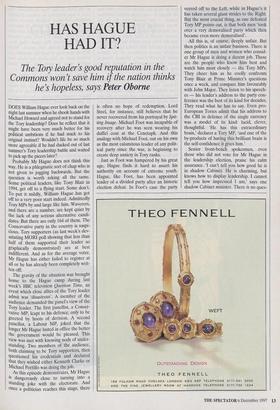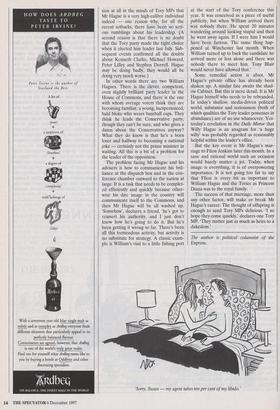HAS HAGUE HAD IT?
The Tory leader's good reputation in the Commons won't save him if the nation thinks
he's hopeless, says Peter Oborne DOES William Hague ever look back on the night last summer when he shook hands with Michael Howard and agreed not to stand for the Tory leadership? Does he reflect that it might have been very much better for his political ambitions if he had stuck to his original instinct? Wouldn't life be so much more agreeable if he had ducked out of last summer's Tory leadership battle and waited to pick up the pieces later?
Probably Mr Hague does not think this way. He is a phlegmatic sort of chap who is not given to jogging backwards. But the question is worth asking all the same. Some political leaders, like Tony Blair in 1994, get off to a flying start. Some don't. To put it mildly, William Hague has got off to a very poor start indeed. Admittedly Tory MPs by and large like him. Waverers, and there are a number, are kept quiet by the lack of any serious alternative candi- dates. But there are only 164 of them. The Conservative party in the country is suspi- cious. Tory supporters (as last week's dev- astating MORI poll showing that less than half of them supported their leader so graphically demonstrated) are at best indifferent. And as for the average voter, Mr Hague has either failed to register at all or he has already been completely writ- ten off.
The gravity of the situation was brought home to the Hague camp during last week's BBC television Question Time, an event which close allies of the Tory leader admit was 'disastrous'. A member of the audience demanded the panel's view of the Tory leader. The first panellist, a Conser- vative MP, leapt to his defence, only to be greeted by hoots of derision. A second panellist, a Labour MP, joked that the longer Mr Hague lasted in office the better the government would be pleased. This view was met with knowing nods of under- standing. Two members of the audience, both claiming to be Tory supporters, then questioned his credentials and declared that they wished either Kenneth Clarke or Michael Portillo was doing the job. As this episode demonstrates, Mr Hague is dangerously close to turning into a standing joke with the electorate. And once a politician reaches this stage, there is often no hope of redemption. Lord Steel, for instance, still believes that he never recovered from his portrayal by Spit- ting Image. Michael Foot was incapable of recovery after he was seen wearing his duffel coat at the Cenotaph. And this analogy with Michael Foot, out on his own as the most calamitous leader of any polit- ical party since the war, is beginning to create deep anxiety in Tory ranks.
Just as Foot was hampered by his great age, Hague finds it hard to assert his authority on account of extreme youth. Hague, like Foot, has been appointed leader of a divided party after an historic election defeat. In Foot's case the party veered off to the Left, while in Hague's it has taken several giant strides to the Right. But the most crucial thing, as one defeated Tory MP points out, is that both men 'took over a very demoralised party which then became even more demoralised'.
All this is, of course, deeply unfair. But then politics is an unfair business. There is one group of men and women who consid- er Mr Hague is doing a decent job. These are the people who know him best and watch him most closely — the Tory MPs. They cheer him as he coolly confronts Tony Blair at Prime Minister's questions once a week, and compare him favourably with John Major. They listen to his speech- es — his leader's address to the party con- ference was the best of its kind for decades. They read what he has to say. Even pro- European Tories admit that his address to the CBI in defence of the single currency was a model of its kind: lucid, clever, thoughtful. 'He has this extraordinary brain,' declares a Tory MP, 'and one of the by-products of having this brilliant brain is the self-confidence it gives him.'
Senior front-bench spokesmen, even those who did not vote for Mr Hague in the leadership election, praise his calm assurance. 'I can't tell you how good he is in shadow Cabinet. He is charming, but knows how to display leadership. I cannot tell you how impressed I am,' says one shadow Cabinet minister. There is no ques- tion at all in the minds of Tory MPs that Mr Hague is a very high-calibre individual indeed — one reason why, for all the recent setbacks, there have been no seri- ous rumblings about his leadership. (A second reason is that there is no doubt that the Tory party made the right choice when it elected him leader last July. Sub- sequent events confirmed all the doubts about Kenneth Clarke, Michael Howard, Peter Lilley and Stephen Dorrell. Hague may be doing badly, they would all be doing very much worse.) In other words there are two William Hagues. There is the clever, competent, even slightly brilliant party leader in the House of Commons, and there is the one with whom average voters think they are becoming familiar, a young, inexperienced, bald bloke who wears baseball caps. They think he leads the Conservative party, though they can't be sure, and who gives a damn about the Conservatives anyway? What they do know is that he's a born loser and halfway to becoming a national joke — certainly not the prime minister in waiting. All this is a bit of a problem for the leader of the opposition.
The problem facing Mr Hague and his advisers is how to communicate his bril- liance at the dispatch box and in the con- ference chamber outward to the nation at large. It is a task that needs to be complet- ed efficiently and quickly because other- wise his dire image in the country will communicate itself to the Commons, and then Mr Hague will be all washed up. `Somehow', declares a friend, 'he's got to reassert his authority, and I just don't know how he's going to do it. But he's been getting it wrong so far. There's been all this tremendous activity, but activity is no substitute for strategy. A classic exam- ple is William's visit to a little fishing port at the start of the Tory conference this year. It was conceived as a piece of useful publicity, but when William arrived there was nobody there. He spent 20 minutes wandering around looking stupid and then he went away again. If I were him I would have been furious. The same thing hap- pened at Winchester last month. When William turned up to back the candidate he arrived more or less alone and there was nobody there to meet him. Tony Blair would never have allowed that.'
Some remedial action is afoot. Mr Hague's private office has already been shaken up. A similar fate awaits the shad- ow Cabinet. But this is mere detail. It is Mr Hague himself who needs to be rebranded. In today's shallow, media-driven political world, substance and seriousness (both of which qualities the Tory leader possesses in abundance) are of no use whatsoever. Yes- terday's revelation in the Daily Mirror that Willy Hague is an anagram for 'a huge willy' was probably regarded as reasonably helpful within the leader's office.
But the key event is Mr Hague's mar- riage to Ffion Jenkins later this month. In a sane and rational world such an occasion would barely matter a jot. Today, when image is everything, it is of overpowering importance. It is not going too far to say that Ffion is every bit as important to William Hague and the Tories as Princess Diana was to the royal family.
The success of that marriage, more than any other factor, will make or break Mr Hague's career. The thought of offspring is enough to send Tory MPs delirious. so hope they come quickly,' declares one Tory MP. 'They matter just as much as heirs to a dukedom.'
The author is political columnist of the Express.
`Sony, Susan — my agent takes ten per cent of my libido.'



















































































 Previous page
Previous page